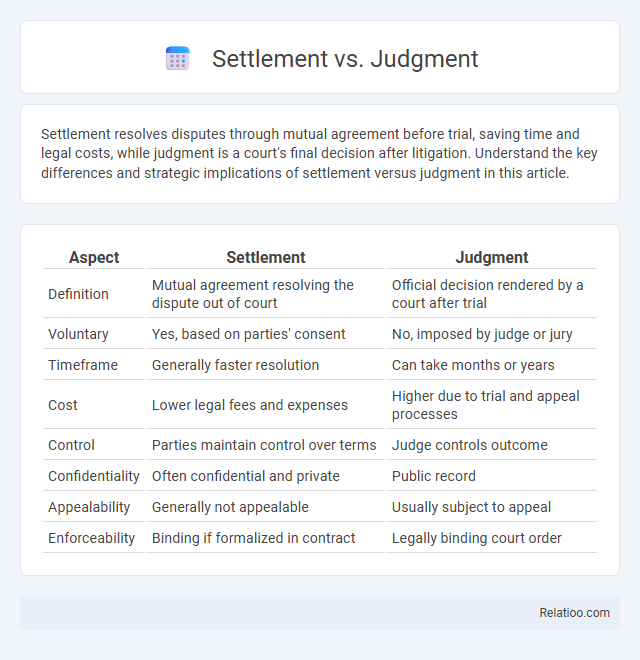Settlement resolves disputes through mutual agreement before trial, saving time and legal costs, while judgment is a court's final decision after litigation. Understand the key differences and strategic implications of settlement versus judgment in this article.
Table of Comparison
| Aspect | Settlement | Judgment |
|---|---|---|
| Definition | Mutual agreement resolving the dispute out of court | Official decision rendered by a court after trial |
| Voluntary | Yes, based on parties' consent | No, imposed by judge or jury |
| Timeframe | Generally faster resolution | Can take months or years |
| Cost | Lower legal fees and expenses | Higher due to trial and appeal processes |
| Control | Parties maintain control over terms | Judge controls outcome |
| Confidentiality | Often confidential and private | Public record |
| Appealability | Generally not appealable | Usually subject to appeal |
| Enforceability | Binding if formalized in contract | Legally binding court order |
Understanding Settlements and Judgments
Understanding settlements and judgments is crucial in legal disputes. A settlement is an agreement reached between parties to resolve the issue without going to trial, often saving time and legal costs while allowing you to control the outcome. In contrast, a judgment is a court's final decision after a trial, legally binding and enforceable, which may result in monetary compensation or specific actions ordered by the court.
Key Differences Between Settlement and Judgment
Settlement resolves disputes through mutual agreement before trial, allowing You to control the outcome and avoid prolonged litigation costs. Judgment, on the other hand, is a court's final decision imposed after a trial, often resulting in a binding and enforceable ruling without the parties' input. Submission involves referring a dispute to arbitration or another third party for binding resolution, differing fundamentally from both settlement and judgment processes.
Legal Process: How Settlements Are Reached
In the legal process, settlements are reached through negotiation between parties aiming to resolve disputes without a trial, often involving compromise and confidentiality agreements. A judgment is the formal decision issued by a court after evaluating evidence and legal arguments, providing a binding resolution enforced by law. Submission refers to the act of presenting a dispute for decision, either by agreeing to arbitration or by formally filing the case in court, initiating the path toward settlement or judgment.
Legal Process: How Judgments Are Issued
In the legal process, a settlement is an agreement reached between parties to resolve a dispute without a trial, typically documented and enforced as a contract. A judgment is a formal decision issued by a court after evaluating evidence and arguments, legally binding and enforceable by law. Submission refers to the act of presenting a case or evidence to the court for review, initiating the court's authority to issue a judgment.
Pros and Cons of Settling a Case
Settling a case offers the advantage of faster resolution and reduced legal costs compared to prolonged litigation. It allows parties to maintain control over the outcome and often preserves business relationships by avoiding the adversarial nature of court judgments. However, settlements may involve compromises that leave parties less satisfied and lack the finality and public precedent established by court judgments or submissions.
Pros and Cons of Pursuing a Judgment
Pursuing a judgment legally confirms Your claim and enforces the decision through the court system, offering clear resolution and potential for asset seizure if the opposing party defaults. However, obtaining a judgment can be costly and time-consuming, and enforcement may still prove challenging if the debtor lacks sufficient assets. While judgments provide finality, they also risk strained relationships and limited flexibility compared to settlements or submissions.
Financial Implications: Settlement vs Judgment
A settlement typically results in a negotiated agreement where parties agree on a financial amount resolved outside court, often saving time and legal costs compared to a judgment. A judgment is a court's official decision that imposes a financial liability enforceable by law, which may include interest, penalties, and collection costs if unpaid. Settlements provide predictability and control over financial outcomes, whereas judgments may involve prolonged enforcement and potentially higher total expenses.
Enforceability: Collecting on Settlements and Judgments
Settlements often result in enforceable agreements once properly documented, enabling parties to collect through contract enforcement or consent orders. Judgments issued by courts are typically easier to enforce using formal legal mechanisms such as wage garnishment, liens, or asset seizures. Submissions, such as arbitration submissions, require an arbitral award to become enforceable, which is generally recognized under international conventions like the New York Convention.
Impact on Public Record and Privacy
Settlement agreements typically remain confidential, minimizing any impact on public records and preserving your privacy by avoiding court filings. Judgments are entered into public records, making case outcomes accessible to the public and potentially affecting your reputation or personal information exposure. Submissions may vary depending on jurisdiction but often become part of the court record, influencing both public access and privacy similarly to judgments.
Choosing the Best Option: Factors to Consider
Choosing between settlement, judgment, and submission depends on factors such as cost efficiency, time sensitivity, and control over the outcome. Settlement offers flexibility and confidentiality, often reducing legal expenses and preserving relationships, while judgment provides a definitive, enforceable resolution through a court decision but can be time-consuming and costly. Submission, particularly in arbitration or mediation, balances neutrality and speed, making it ideal when parties seek a binding decision without prolonged litigation.

Infographic: Settlement vs Judgment
 relatioo.com
relatioo.com